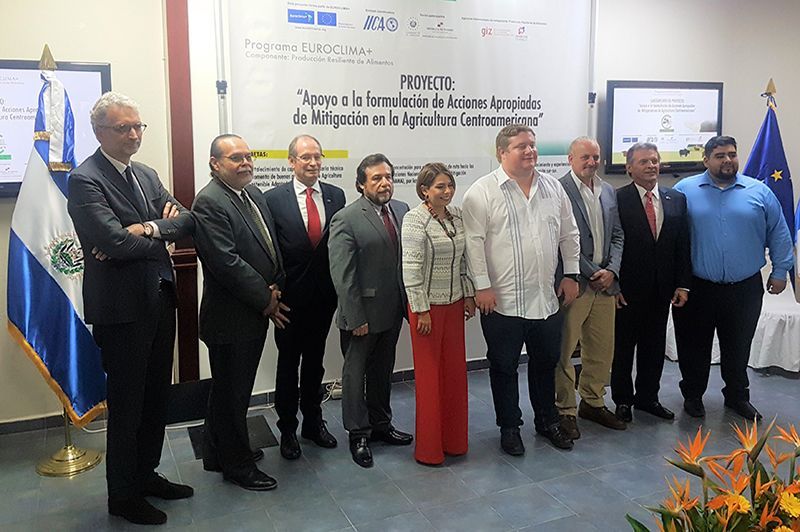The knowledge generated by the project - which is only being implemented in El Salvador and Panama - will promote cooperation and exchange on mitigation
and adaptation to climate variability with the rest of Central American countries.
La Libertad, El Salvador. November 7, 2019. "We have a serious problem due to climate change. We need to have wisdom about how to combine economic development with education in an industry such as cattle ranching, in order to develop other techniques for managing this industry with innovative practices," said the Vice President of El Salvador, Felix Ulloa, during the launch of the project “Support for the formulation of Appropriate Mitigation Actions in Central American Agriculture,” which is part of the EUROCLIMA+ Programme funded by the European Union.
The objective of the project is to strengthen capacities to achieve ownership and public-private consensus for the formulation of roadmaps on Nationally Appropriate Mitigation Actions (known as NAMA) in Panama (rice sector) and El Salvador (cattle sector), towards low-carbon development, in support of compliance with Nationally Determined Contributions (NDCs) defined by each country in the framework of the Paris Agreement.
In both countries, a baseline will be defined on Greenhouse Gases (GHG), best practices in Climate-Adapted Sustainable Agriculture (CASA), and there will be an emphasis on a gender approach in the implementation of actions. The initiative includes dialogues with trade unions, organisations, rice producers in Panama and cattle producers in El Salvador.
"For the European Union, climate change is one of the greatest challenges on the planet, as it is damaging economic development, and especially the most vulnerable populations," said Pierre-Yves Baulain, Head of Cooperation for the European Union Delegation in El Salvador, during his speech.
The technical coordination and execution of the project is the responsibility of the Inter-American Institute for Cooperation on Agriculture (IICA) in coordination with the Ministry of Agricultural Development (MIDA) of Panama as co-executor. The counterparts are the Ministry of Agriculture and Livestock (MAG) and the Ministry of Environment and Natural Resources (MARN) of El Salvador, and the Central American Agricultural Council (CAC).
The project will last 24 months. In El Salvador, 1,000 ranchers from the priority territories in the departments of Chalatenango and Morazán will participate in sharing and disseminating information on sustainable low-carbon livestock production practices. Sustainable low-carbon livestock production includes management practices and techniques that are based on maintaining the productive system with carbon sequestration, through multi-purpose tree plantations and pastures, and reducing greenhouse gases in the atmosphere to balance the gases emitted with the gases captured on the farm.
In addition, 200 Salvadorans, women and men involved in very small-scale cattle ranching, will receive direct technical assistance to learn about and implement silvopastoral systems.
Awareness, technical advice and training actions will also be developed through Farmer Field Schools (ECA), establishment of pilot farms, follow-up visits and field demonstrations; as well as courses, workshops and training events that encourage selected practices such as: fodder banks, planting improved hybrid pastures, living fences, water reservoirs, management of fertilisers and manure, among other elements used for sustainable livestock production.
“Here in El Salvador, through work with livestock producer organisations and the Ministry of Agriculture, we hope to develop experiences that can be taken to other parts of the Central American region. In addition to the impact on production, this can also lead to competitive advantages in markets in which consumers expect high quality products with reduced environmental impact,” said the representative of the European Union Delegation in El Salvador.
For his part, the Vice-President of El Salvador thanked the “always generous and timely collaboration and cooperation of the European Union, this time through the EUROCLIMA+ Programme".
 |
About the projects of the EUROCLIMA+ Resilient Food Production component
Resilient Food Production (RFP) projects aim to strengthen capacities at local, national and regional levels to increase resilience to climate change, the efficiency of agricultural and livestock production systems with respect to carbon and water, as well as food value chains according to their sectoral commitments within the framework of NDC implementation. RFP is a component implemented by GIZ and Expertise France.
About EUROCLIMA+
EUROCLIMA+ is a programme funded by the European Union to promote environmentally sustainable and climate-resilient development in 18 Latin American countries, particularly for the benefit of the most vulnerable populations. The Programme is implemented under the synergistic work of seven agencies: Spanish Agency for International Development Cooperation (AECID), French Development Agency (AFD), Economic Commission for Latin America and the Caribbean (ECLAC), Expertise France (EF), International and Ibero-American Foundation for Administration and Public Policies (FIIAPP), the German society for international cooperation (GIZ), and UN Environment.
This programme is co-financed by the Federal Government of Germany through the Federal Ministry for Economic Cooperation and Development (BMZ) as well as the Governments of France and Spain.
Contacts
For more information contact Jorge Trejo, Project Coordinator: This email address is being protected from spambots. You need JavaScript enabled to view it.
Press contact: Cindy Hernández This email address is being protected from spambots. You need JavaScript enabled to view it.
